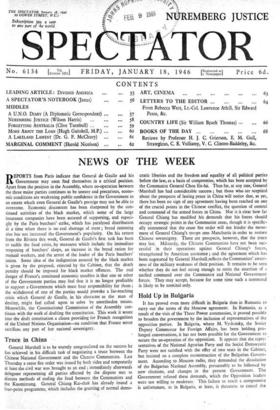Truce in China • General Marshall is to be warmly
congratulated on the success he has achieved in his difficult task cif negotiating a truce between the Chinese National Government and the Chinese Communists. Last Thursday a cease fire order was issued by both sides and temporarily at least the civil war was brought to an end ; immediately afterwards delegates representing all parties affected by the dispute met to discuss methods of ending the feud between the Communists and the Kuomintang. General Chiang Kai-shek has already issued a four-point programme, which includes the granting of normal demo- cratic liberties and the freedom and equality of all political parties before the law, as a basis of compromise, which has been accepted by the Communist General Chou En-lai. Thus far, at any rate, General 'Marshall has had considerable success ; but those who are sceptical about the prospects of lasting peace in China will notice that, as yet, there has been no sign of any agreement having been reached on one of the crucial points in the Chinese conflict, the question of control and command of the armed forces in China. Nor is it clear how far General Chiang has modified his demands that his forces should occupy strategic points in the Communist areas, though it is specific- ally announced that the cease fire order will not hinder the move- ment of General Chiang's troops into Manchuria in order to restore Chinese sovereignty. There are prospects, however, that the truce may last. Militarily, the Chinese Communists have not been suc- cessful in their operations against General Chiang'F forces, strengthened by American assistance ; and the agreement which has been negotiated by General Marshallseflects the Communists' aware- ness of the military weakness of their position. It remains to be seen whether they do not feel strong enough to resist the assertion of 3 unified command over the Communist and National Government forces. They may accept, because for some time such a command is likely to be nominal only.


























